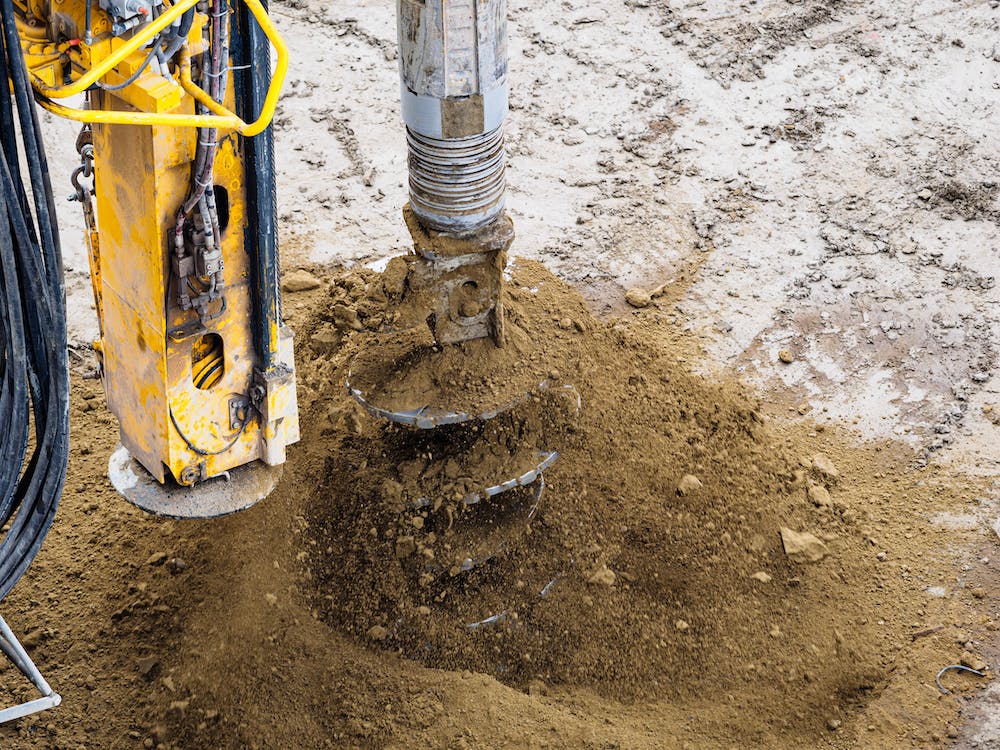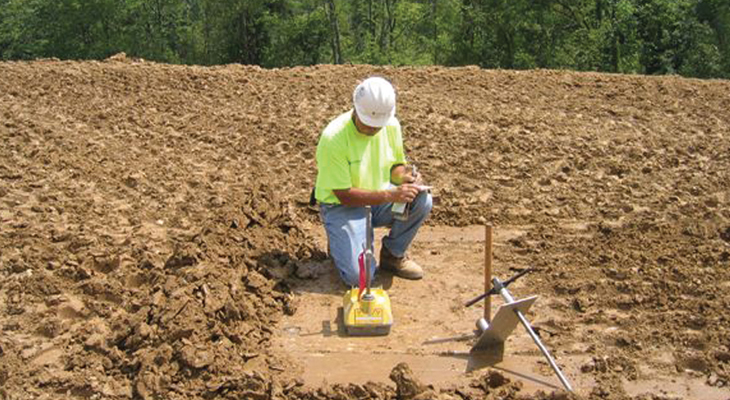Everything You Need to Learn About Geotechnical Engineering for Your Next Project
The Value of Geotechnical Engineering in Resolving Environmental Difficulties and Enhancing Building And Construction Safety And Security
Geotechnical engineering offers as a cornerstone in the crossway of ecological stewardship and construction security, giving crucial insights right into the actions of soil and rock under numerous problems. By applying critical site investigations and customized reduction steps, geotechnical designers play a crucial role in guarding both human lives and ecological honesty.

Function of Geotechnical Engineering
Geotechnical design plays a critical duty in the layout and building and construction of infrastructure by addressing the behavior of soil and rock products under numerous problems. This field of design is important for recognizing the communication in between structures and the ground, that includes figuring out the load-bearing capacity of dirt, evaluating stability, and anticipating prospective settlement or failure.
Geotechnical engineers are in charge of carrying out website examinations, which include tasting and screening dirt and rock to collect data on their chemical and physical buildings. This info is essential for designing foundations, retaining wall surfaces, and various other earth-retaining frameworks that make certain safety and security and longevity. Geotechnical design educates the option of suitable building and construction methods and materials, thus decreasing dangers associated with dirt actions.
Additionally, the assimilation of geotechnical engineering concepts right into metropolitan planning and environmental management is important for resolving difficulties such as ground contamination and groundwater management. By comprehending geotechnical elements, designers can establish lasting remedies that enhance the strength of infrastructure against natural threats, while also promoting environmental stewardship. Eventually, the role of geotechnical engineering is important for achieving risk-free, resilient, and environmentally aware construction techniques.
Soil Erosion Reduction
Dirt disintegration positions a substantial hazard to both ecological security and facilities stability, affecting around 24 billion lots of productive soil lost annually worldwide. This phenomenon is exacerbated by factors such as logging, urbanization, and poor agricultural techniques. Geotechnical engineering plays an essential function in developing efficient dirt disintegration mitigation approaches that guard both the setting and building jobs.
One strategy involves the application of erosion control techniques such as plants growing, which supports soil via root systems. In addition, the building and construction of retaining wall surfaces and balconies can successfully lower surface area overflow and protect prone locations from erosion. Correct drain layout is likewise important; it minimizes water buildup and directs excess runoff far from vital structures.
Additionally, geotechnical engineers utilize dirt stablizing strategies, such as the application of geotextiles and naturally degradable floor coverings, to improve soil communication and stop deterioration - geotechnical engineer description. Normal surveillance and assessment of erosion-prone websites enable timely interventions, making certain long-lasting sustainability. By incorporating these approaches, geotechnical engineering not just minimizes the effects of soil disintegration yet also adds to the durability of facilities versus environmental obstacles, ultimately promoting a much safer and much more sustainable developed atmosphere
Groundwater Security Strategies
Groundwater offers as a vital source for drinking water, farming, and industrial procedures, making its protection essential for ecological sustainability and public wellness. Efficient groundwater protection strategies are important in mitigating contamination threats and making certain the longevity of this resource.

Routine surveillance of groundwater top quality is likewise vital, enabling early discovery of contamination resources and promoting prompt removal initiatives. Using advanced technologies, such as geophysical surveys and remote picking up, aids in identifying potential threats to groundwater books.
Moreover, public education and stakeholder interaction are crucial, fostering area support for groundwater defense campaigns. geotechnical engineer description. By combining governing actions, technical developments, and community involvement, we can create a comprehensive framework that safeguards groundwater sources while advertising lasting growth and construction practices
Landslide Risk Administration
Landslides present significant risks to both human security and framework, making reliable risk monitoring strategies important. Geotechnical design plays an important function in identifying, evaluating, and mitigating landslide threats. A detailed understanding of incline stability, soil technicians, and hydrology is important for developing efficient threat monitoring strategies.
The initial step in landslide risk management involves detailed site investigations, which include geological mapping and soil screening. These investigations assist engineers review the potential for landslides by recognizing critical factors such as slope angles, soil structure, and water material. Using sophisticated technologies such as remote noticing and geophysical studies can boost the precision of these analyses.
As soon as dangers are identified, ideal mitigation procedures can be carried out. These may consist of engineering solutions such as keeping wall surfaces, water drainage systems, and slope stablizing methods. Checking systems ought to be developed to identify signs of ground motion and changes in water levels, permitting for aggressive treatments.

Enhancing Building And Construction Security
Building sites frequently present a myriad of hazards that can jeopardize employee safety and job honesty. Geotechnical design plays an important role in enhancing construction safety and security by supplying essential understandings right into subsurface conditions. Through thorough dirt and rock analysis, geotechnical engineers can identify possible threats, such as dirt instability, groundwater problems, and seismic vulnerabilities, which may jeopardize the safety of building and construction activities.
Carrying out geotechnical services, such as correct structure layout and the use of maintaining frameworks, alleviates these dangers dramatically. These options not only guarantee the security of the frameworks being constructed but also create a much safer about geotechnical engineering working atmosphere for building workers.
In addition, cultivating a culture of safety and security via training and adherence to developed security procedures further boosts building and construction site security. browse around this web-site By integrating geotechnical proficiency right into the planning and execution stages, building and construction jobs can achieve greater security requirements, inevitably securing employees and ensuring effective job completion.
Verdict
Finally, geotechnical engineering works as an important discipline in dealing with ecological obstacles and advertising building safety and security. Via efficient dirt disintegration mitigation, groundwater security strategies, and landslide danger administration, geotechnical engineers add to the advancement of resistant infrastructure. The integration of these techniques fosters a more secure building environment and boosts the sustainability of civil engineering jobs. Eventually, the know-how of geotechnical designers is crucial in safeguarding both natural deposits and human lives versus potential risks.
Geotechnical engineering serves as a foundation in the intersection of ecological stewardship and building and construction safety and security, providing vital understandings into the behavior of dirt and rock under various problems. Geotechnical engineering notifies the selection of proper construction methods and products, thus decreasing dangers connected with dirt habits.
Geotechnical engineering plays an essential duty in establishing effective dirt erosion reduction approaches that safeguard both the environment and construction jobs.
Additionally, geotechnical designers employ dirt stabilization methods, such as the application of geotextiles and eco-friendly mats, to enhance dirt cohesion and protect against deterioration. Through extensive dirt and rock evaluation, geotechnical designers can identify potential threats, such as dirt instability, groundwater issues, and more info here seismic vulnerabilities, which may jeopardize the security of building and construction tasks.